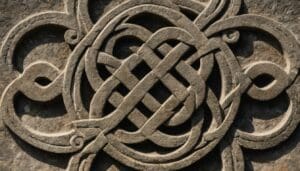Top 9 Interesting Facts about Bob Geldof
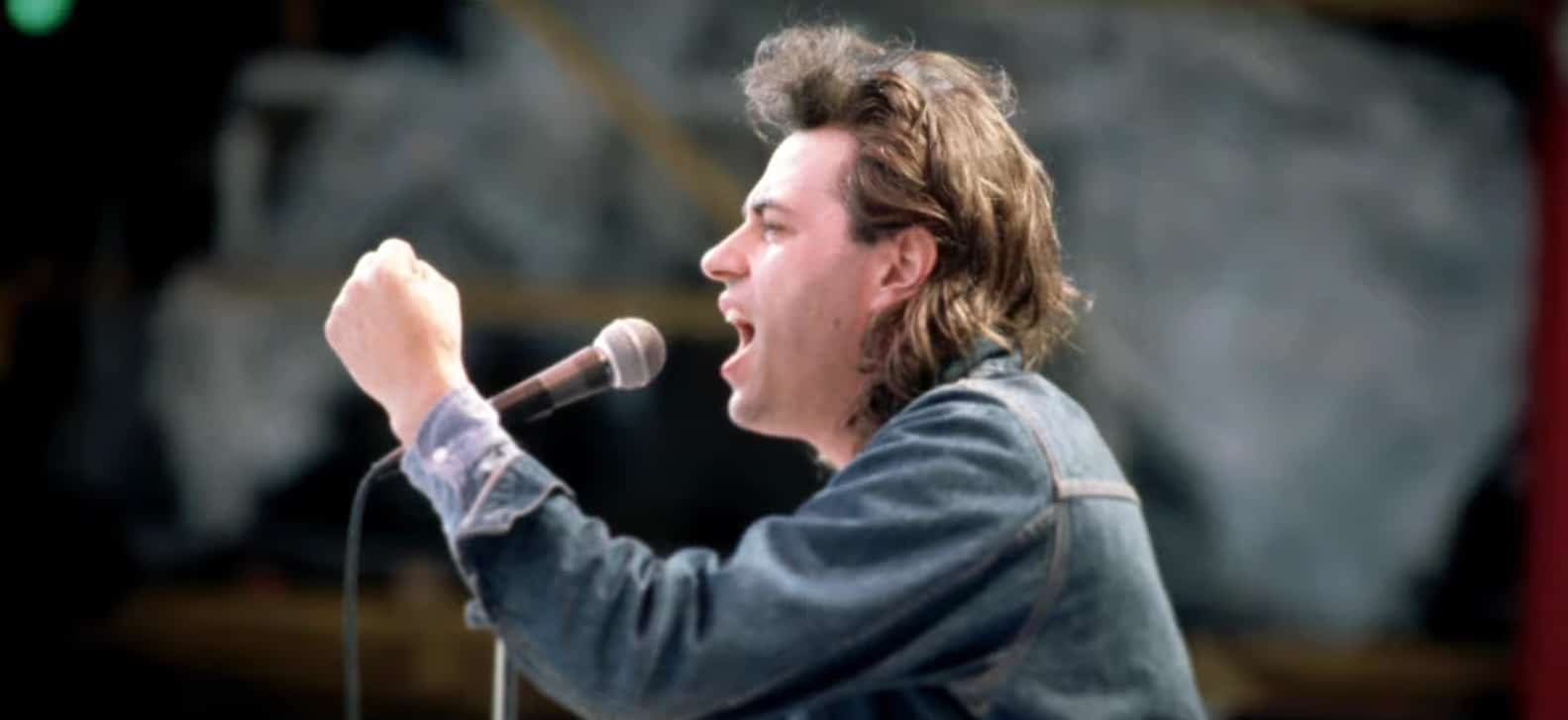
Updated On: November 08, 2023 by Dina Essawy
Robert Frederick Zenon Geldof (aka Bob Geldof) is an Irish musician, actor, and campaigner. He first gained notoriety in the late 1970s as the main singer of the Irish rock band Boomtown Rats, which became well-known during the punk rock era. “Rat Trap” and “I Don’t Like Mondays,” two of his compositions, were the band’s top hits in the UK. In the 1982 film adaptation of Pink Floyd’s The Wall, Geldof played the part of “Pink.” In addition to planning these events, Geldof organised the charity supergroup Band Aid, and the events Live Aid and Live 8. One of the all-time best-selling singles, “Do They Know It’s Christmas?”
Geldof is well known for his activism, particularly his work to end poverty in Africa. To generate money for famine assistance in Ethiopia, he and Midge Ure established the nonprofit supergroup Band Aid in 1984. They later organised the Live 8 concerts in 2005 and the charity mega-concert Live Aid the year after. A member of the Africa Progress Panel (APP), a group of 10 eminent people who advocate at the highest levels for fair and sustainable development in Africa, Geldof presently acts as an adviser to the ONE Campaign, co-founded with fellow Irish rock musician and activist Bono. Geldof, a single parent, has been a vocal supporter of the fathers’ rights movement.
Elizabeth II awarded Geldof an honorary knighthood (KBE) in 1986 for his humanitarian efforts in Africa. However, it is just an honorary title because Geldof is an Irish citizen, he is sometimes referred to as “Sir Bob.” Among many other honours and nominations, he has received the Man of Peace title, which honours those who have “made an extraordinary contribution to world social justice and peace.” The Brit Award for Outstanding Contribution to Music was given to him in 2005.
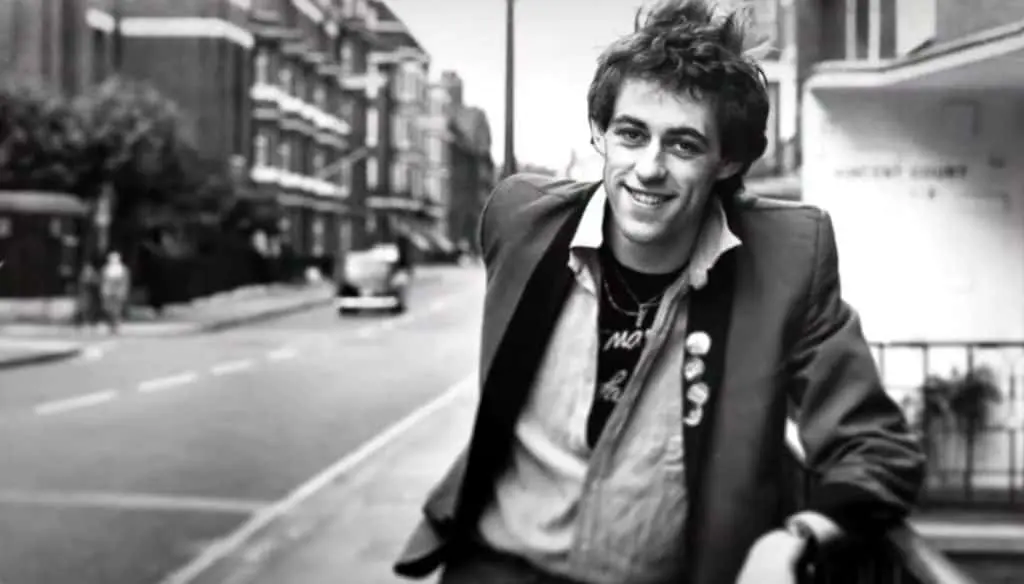
Bob Geldof: The Early Years
Geldof, the son of Robert and Evelyn Geldof, was born and raised in Dn Laoghaire, Ireland. Zenon Geldof, his paternal grandpa, was a Belgian immigrant and hotel cook. Amelia Falk, a British Jew from London who was of German and Jewish ancestry, was his paternal grandmother. Evelyn Geldof, Geldof’s mother, passed away at age 41 from a brain haemorrhage when Geldof was six years old. When Geldof was a student at Blackrock College, he endured bullying because he was a lousy rugby player and Zenon was his middle name. After working in Wisbech, England, as a slaughterman, road navvy, and pea canner, he was employed as a music journalist for The Georgia Straight in Vancouver, British Columbia, Canada. He briefly served as a guest host on a children’s show on the CBC.
His Singing Career
When he moved back to Ireland in 1975, he joined the Boomtown Rats, its lead singer, a rock band intimately associated with the punk movement. Rat Trap, the first new wave chart-topper in Britain, was the first No. 1 single for The Boomtown Rats in the UK in 1978. With their second UK No. 1 song, “I Don’t Like Mondays,” they attracted fame on a global scale in 1979. Both success and controversy surrounded this. Following Brenda Ann Spencer’s attempted murder at an elementary school in San Diego, California, in 1979, Geldof had penned it. The Boomtown Rats issued their album, Mondo Bongo, in 1980.
Geldof has a reputation for being an entertaining interviewee. When the Boomtown Rats made their debut on Ireland’s The Late Late Show, host Gay Byrne observed that frontman Bob Geldof was being purposefully gruff. During the interview, Geldof lambasted Irish politicians and the Catholic Church, which he blamed for many of the nation’s issues. Nuns in the crowd attempted to stifle him, but he answered by claiming that they led “a comfortable existence with no material problems in exchange for which they committed themselves body and spirit to the church.” Additionally, he berated Blackrock College. The Boomtown Rats were unable to perform in Ireland again as a result of the controversy the interview provoked.
The Boomtown Rats would reunite to perform together for the first time since 1986 at the Isle of Wight Festival in 2013, according to an announcement made by Geldof in January of that year. Further tour dates were soon confirmed, and a new CD, Back to Boomtown: Classic Rats Hits, was also published. To start a solo career and release his best-selling book, Is That It?, Geldof broke away from the Boomtown Rats in 1986.
The smash songs “This Is The World Calling” (co-written with Dave Stewart of the Eurythmics) and “The Great Song of Indifference” was produced from his first solo albums, which did moderately well in sales. A performance of “Comfortably Numb” with David Gilmour is captured on the DVD David Gilmour in Concert. He occasionally shared the stage with other musicians, such as Thin Lizzy and David Gilmour (2002). He sang a song he jokingly claimed to have co-written with Mercury, “Too Late God,” during the Freddie Mercury Tribute Concert in 1992 at the former Wembley Stadium with the remaining members of Queen.
In addition, Geldof has performed as a DJ for XFM radio. He incorrectly reported Ian Dury’s cancer death in 1998, probably as a result of false information provided by a listener who was upset over the station’s ownership transition. Because of the incident, the music publication NME dubbed Geldof “the world’s worst DJ.”
He has spent a lot of time since 2000 working on the debt relief for developing nations’ campaign alongside Bono of U2. Since the release of the album Sex, Age & Death in 2001, Geldof has been unable to continue his musical career due to his obligations in this area, including the organisation of the Live 8 events. Despite not being British, he was included in a survey of the general population in 2002 as one of the 100 Greatest Britons. After Live 8, Geldof resumed his musical career by releasing Great Songs of Indifference – The Anthology 1986-2001 in late 2005, a box set comprising all of his solo albums. Geldof went on tour after the album was released, to varying degrees of success.
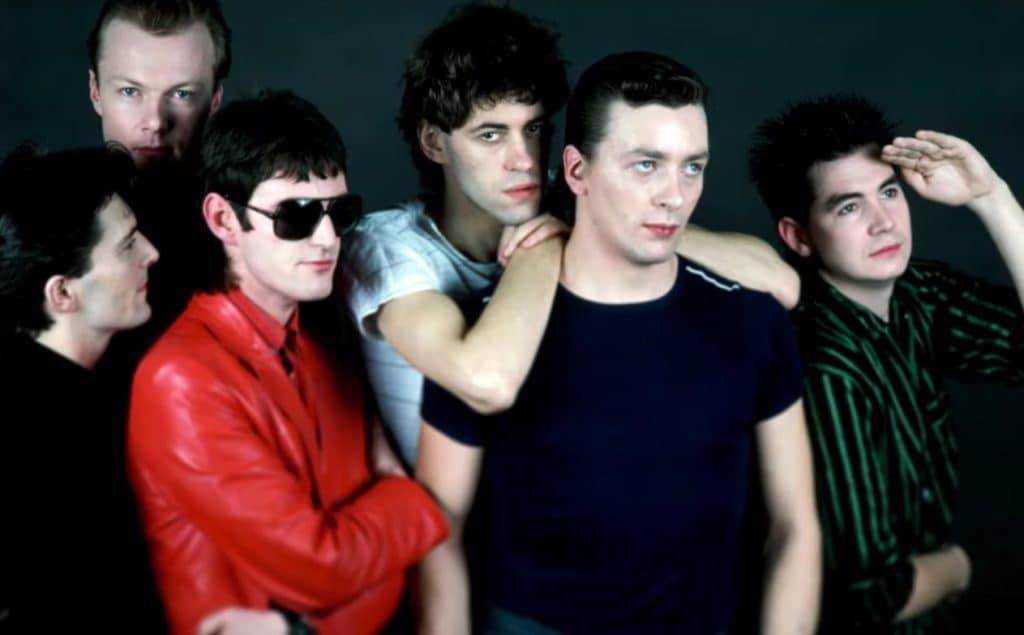
In July 2006, when Geldof was set to perform at Milan’s Arena Civica, a stadium with a capacity of 12,000, he discovered that the organisers had not made the tickets available for general sale and that just 45 people had shown up. When Geldof saw how few people were in attendance, he declined to take the stage. Geldof made a point of stopping to sign autographs for all in attendance as a little gesture of appreciation. In Naples, Italy, in October 2006, he then performed in a well-attended free Storytellers performance for MTV Italy.
Personal Life
Paula Yates was Geldof’s longtime partner and first wife. Yates worked as a rock writer before taking over as host of the music programme The Tube from 1982 until 1987. She was well-known for conducting in-bed interviews on the 1992 episode of The Big Breakfast. When Yates first started obsessing about The Boomtown Rats in the band’s early years, Geldof and Yates became friends. When Yates surprised him by flying to Paris while the band was performing there in 1976, they started dating. The couple’s first child, Fifi Trixibelle Geldof, was born on March 31, 1983, before they got married. Because Yates wanted a “belle” in the family, she was given the name Fifi in honour of Trixibelle and Bob’s aunt Fifi.
After dating for ten years, Simon Le Bon served as Geldof’s best man for their June 1986 Las Vegas wedding to Yates. Peaches Honeyblossom Geldof and Little Pixie Geldof were the couple’s next two children, born on 13 March 1989 and 17 September 1990, respectively. According to rumours, Pixie was given her name after the famous daughter character from the cartoon Celeb in the satirical magazine Private Eye, which was itself a parody of the names the Geldofs’ other kids were given.
Yates switched from Geldof to Australian band INXS’s lead vocalist Michael Hutchence in February 1995. When Yates interviewed Hutchence for The Tube in 1985, she first got to know him. In May 1996, Geldof and Yates were divorced. In July 1996, Yates and Hutchence gave birth to a daughter, Heavenly Hirani Tiger Lily Hutchence.
On November 22, 1997, Hutchence killed himself in a hotel room in Sydney. Geldof and Yates did not provide their phone records to the police before Hutchence’s death, but after his death, both provided police statements on the calls they had with Hutchence that morning. “He was afraid and couldn’t bear a minute more without his baby,” Yates said in a statement on November 26. “
I don’t know how I’ll live without watching Tiger,” he said. Yates said that about his power following Live Aid, Geldof had stated repeatedly, “Don’t forget, I am above the law.” According to Geldof’s police statements and testimony to the coroner, Hutchence was “hectoring, abusive, and threatening,” but Geldof calmly listened to him. The contents of this call were corroborated by a friend of Yates and Geldof, who also stated that Geldof had remarked, “I know what time the conversation ended, it was 20 to 7, I was going to file it as a threatening call.” At around 5:00 in the morning, the guest in the hotel room next to Hutchence’s heard a loud male voice swearing. The coroner was confident that Hutchence and Geldof were disputing in this voice.
Later, Geldof went to court and won complete custody of his three kids. Since then, he has become a vocal supporter of fathers’ rights. Tiger Hutchence was given formal guardianship by Geldof when Yates passed away in 2000 from a drug overdose, and she was later adopted in 2007. Tiger’s full name, as of 2019, is Heavenly Hirani Tiger Lily Hutchence Geldof. As one of the first astronauts on the $100,000 per person Space XC commercial programme, Geldof aspired to become the first Irish person in space in 2014.
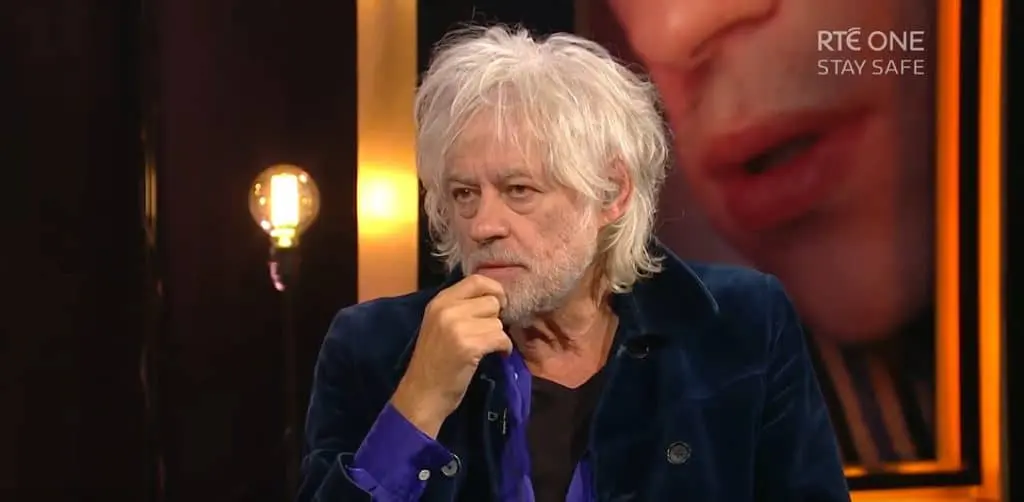
Charitable Work
In September 1981, Geldof participated in his first significant charitable event as a solo performer for Amnesty International’s benefit production of The Secret Policeman’s Other Ball at the Drury Lane Theater in London’s West End. Martin Lewis, the producer of the Amnesty performance, invited Geldof to sing a solo rendition of “I Don’t Like Mondays.” Other rock musicians had ‘placed a seed’ and seemed to have had a similar impact on Geldof. The programme was created by Monty Python veteran John Cleese, and according to Sting, Geldof “took the ‘Ball’ and ran with it.”
In response to a 1984 BBC News story by Michael Buerk on the famine in Ethiopia, Geldof rallied the pop culture to act in response to the sights he had witnessed. He co-wrote “Do They Know It’s Christmas?” with Midge Ure of Ultravox to raise money. The song was recorded by a group of musicians going by the name of Band Aid on November 25, 1984, on a single day at Sarm West Studios in Notting Hill, London. The song sold the most copies in the UK in its first week of availability; it debuted at the top of the UK Singles Chart and remained there for five weeks, becoming the 1984 Christmas top single.
The track went on to sell more than 3 million copies, making it the biggest-selling single in UK history up to that date. It kept that position for over 13 years. The record was also a big smash in the US; by January 1985, it had sold an estimated 2.5 million copies there and peaked at number 13 on the Billboard Hot 100. The single would ultimately sell 11.7 million copies globally. The greatest rock concerts the world has ever seen were planned for the following summer after this enormous success.
In 1989 and 2004, new recordings of “Do They Know It’s Christmas?” were made. In November 2014, Geldof announced that he will be assembling a new iteration of Band Aid, to be called Band Aid 30, to record a new rendition of the charity song, with the earnings going to treat Ebola sufferers in West Africa.
As Geldof learned more about the issue, he came to understand that one of the key factors contributing to African countries’ catastrophic predicament was their duty to repay loans that their countries had obtained from Western banks. Ten times more much would have to depart the nation in debt repayments for every pound contributed in help. It quickly became clear that one song was insufficient.
Live Aid, a massive event held simultaneously at Wembley Stadium in London and John F. Kennedy Stadium in Philadelphia on July 13, 1985, was organised by Geldof and Ure. The concert was also live-broadcast in the UK on television and radio thanks to the BBC’s historic decision to free their schedules for 16 hours of rock music.
Phil Collins took a Concorde flight to perform at both Wembley and Philadelphia on the same day, making it one of the most significant stage performances in history. Geldof scared viewers into contributing money during the Live Aid broadcast by urging them to remain home and watch the programme instead of going out to the pub twice while also profanity-mouthing.
After the London event had been going on for about seven hours, Geldof gave a notorious interview in which he uttered the word fuck. Geldof stopped the BBC interviewer David Hepworth in the middle of his effort to give a list of addresses to which possible donations should be directed, shouting, “Fuck the address, let’s get the numbers!” to the crowd. It was said that his Irish accent caused the swear words to be misheard as “fock” and “focking.”Donations climbed to £300 per second after the outburst.
The concert was successful in part due to the horrifying video of dead, skeleton children that David Bowie unveiled after his performance. The movie was created by CBC photojournalists who put their films to the tune of “Drive” by The Cars. Over £150 million was collected overall by Live Aid for famine assistance. At the age of 34, Geldof was awarded an honorary knighthood in recognition of his services. Is That It? was the title of his autobiography, which he co-wrote shortly after with Paul Vallely. The book gained further notoriety once it was included on the syllabus for the General Certificate of Secondary Education test the following year.
A large portion of the funds generated by Live Aid was sent to Ethiopian NGOs, some of which were governed or influenced by the Derg military junta. According to some journalists, the Derg was able to utilise Live Aid and Oxfam funds to finance its forced relocation and “vilification” programmes, which are alleged to have resulted in at least 3 million people being relocated and 50,000 to 100,000 deaths. But the BBC officially apologised to Geldof in November 2010 for giving the impression in its articles on Band-Aid that the money particularly went toward purchasing weapons, claiming it had “no proof.”
Many of the Live Aid donations were distributed to Ethiopian NGOs, some of which were under the control or influence of the Derg military dictatorship. The Derg is said to have used Live Aid and Oxfam donations to pay for its forced displacement and “vilification” programmes, which are said to have resulted in at least 3 million people being transferred and 50,000 to 100,000 fatalities. But in November 2010, the BBC formally apologised to Geldof for conveying the impression in its Band-Aid pieces that the money was used primarily to buy weapons, admitting it had “no proof.”
The Commission for Africa is the outcome. To conduct a year-long study of Africa’s issues, Blair invited Geldof and 16 other Commissioners, the bulk of whom were from Africa and many of whom were politicians in positions of power. They arrived at two conclusions: first, that Africa needed to change to fight corruption and strengthen government; second, that the developed world needed to help this transition in novel ways. That required increasing aid by double, cancelling debt and changing trade regulations.
The Commission created a thorough strategy on how to do it. It provided a report in March 2005. Geldof decided to launch a new global lobby for Africa with eight concurrent performances throughout the globe to put pressure on the G8. Live 8 is what he gave it. The G8 Gleneagles African debt and aid package was later based on the commission’s recommendations.
The Africa Progress Panel (APP), a group of 10 eminent people who champion just and sustainable development in Africa, includes Geldof as a member. The Panel publishes the Africa Progress Report each year, which identifies a problem of pressing concern to the continent and offers a set of related measures. The jobs, justice, and equity challenges were emphasised in the 2012 Africa Progress Report. The 2013 study described problems with mining, oil, and gas in Africa.
To promote debt relief, third-world trade, and AIDS assistance in Africa, Bono of U2’s organisation DATA (Debt, AIDS, Trade, Africa) created the group in 2002. Bob Geldof was a key member of this group. In 2008, it joined with One Campaign, in which Geldof is also heavily involved. He co-edited a special issue of the Italian daily La Stampa in June 2009 with a focus on the 35th G8 conference on behalf of One Campaign.
The Live 8 initiative, which Geldof and Ure launched on March 31, 2005, aims to increase awareness of problems that affect Africa, such as government debt, trade restrictions, malnutrition, and AIDS-related issues. On July 2, 2005, Geldof organised 10 performances in major cities all around the industrialised globe. They included performers from many musical genres and places throughout the world. Cities in industrialised nations hosted the Live 8 performances, which drew sizable crowds. London, Paris, Berlin, Rome, Philadelphia, Barrie, Chiba, Johannesburg, Moscow, Cornwall, and Edinburgh were the venues.
The performances, which were open to the public and were arranged just days before the G8 economic conference on July 6 at Gleneagles, were free. The “last push” Live 8 concert in Edinburgh was organised by Ure. In a statement, Geldof stated, “The lads and girls with guitars will finally get to flip the planet on its axis.” For the first time since 1981, Roger Waters, the band’s original vocalist and bassist, performed with Pink Floyd in London.
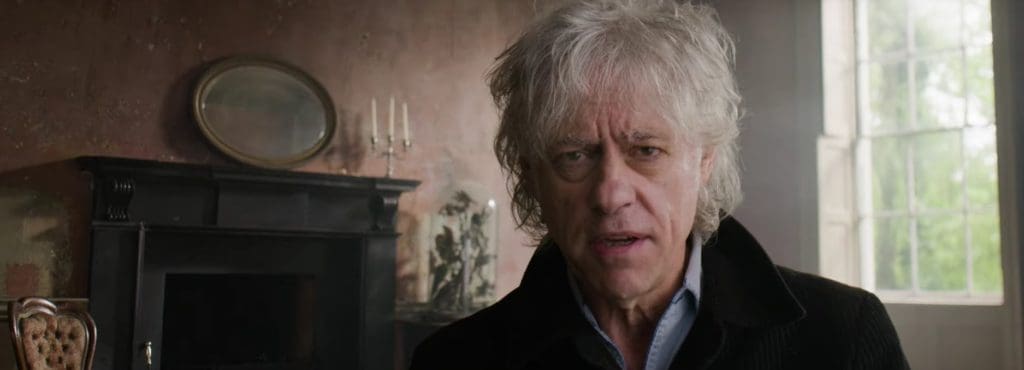
Criticism of His Charitable Activities
Live 8 was a part of the “Make Poverty History” (MPH) campaign, but John Hilary, a senior executive of the campaign at the time, accused Live 8 of sabotaging MPH by scheduling its concerts on the same day as the march in Edinburgh, which was reportedly the largest social justice march in Scottish history. Geldof received criticism for the absence of African performers at Live 8. In response, Geldof said that only the biggest-selling musicians would draw the sizable audience necessary to grab the public’s attention in the lead-up to the G8 conference.
Before the G8 meeting, Geldof, a former member of Tony Blair’s Commission for Africa, which served as the foundation for many of the Gleneagle’s proposals, called Kumi Naidoo’s criticism of the conference “a shame.” The New Internationalist (between January and February 2006) stated that it would be long overdue if Geldof resigned from the international anti-poverty movement after being requested to do so by some prominent African activists.
Additionally, Live 8 was accused of unqualifiedly supporting Tony Blair’s and Gordon Brown’s political and personal agendas, particularly in the run-up to an election. Although many believed British officials, not Geldof, had adopted their agenda in favour of his own, this led to charges that Geldof had compromised his cause.
Many people welcomed the pledges made for Africa at the Gleneagles summit, calling it “the best summit for Africa ever,” “a huge breakthrough on debt,” or “a substantial, albeit imperfect, boost to the growth prospects of the poorest countries” (Kevin Wakins, former head of research at Oxfam).
However, several assistance organisations expressed their dissatisfaction with the decision, believing that the stringent requirements placed on African countries for them to receive debt relief left them a little better off than before. The Boomtown Rats’ whole discography has been reissued, according to The New Internationalist, who criticised him harshly for his role in saving Africa.
Noel Gallagher, the guitarist for Oasis, became one of the most outspoken detractors of Live 8’s effects, claiming the overestimation of the power of rock musicians in the eyes of the general public.
Arguments
On the music television show CountDown: United Kingdom, Geldof used profanity, closing his conversation with Cat Deeley by adding, “Fuck the tape.” When receiving an award at the NME Awards in 2006, Geldof called the host Russell Brand a “cunt.” It’s no surprise Bob Geldof knows so much about starvation, Brand said in response, “He’s been eating out on ‘I Don’t Like Mondays’ for 30 years.”
Then, in the middle of July 2006, he angered a lot of New Zealanders by calling the country’s overseas assistance contribution “shameful” and “pathetic.” The Minister of Foreign Affairs, Winston Peters, retaliated by claiming that Geldof had neglected to acknowledge the “quality” of New Zealand’s aid and other efforts. In the middle of November 2008, Diversity@Work, a local for-profit organisation, invited Geldof to Melbourne to give a speech about Third World poverty and how governments have failed to address the problem. He received a $100,000 payment for his lecture, which included a five-star hotel stay and first-class travel, it was subsequently disclosed.
Liberia Leaks: In a July 2019 report on its “Mauritius Leaks” project by the International Consortium of Investigative Journalists (ICIJ), Bob Geldof was mentioned as allegedly being involved in tax avoidance by companies and someone doing business in Africa and other mainlands. Bob Geldof had previously come under fire for his views on aid to African countries earlier in the decade. His private equity vehicle 8 Miles had subsidiaries in the tax haven of Mauritius, “an offshore jurisdiction with a large network of double taxation treaties in intriguing markets,” to generate a 20% return by only purchasing interests in African startup companies. Geldof opted not to address the revelations.
Entrepreneur
Through his joint ownership of the TV production firm Planet 24, which created the early-morning Channel 4 programme The Big Breakfast, Geldof had established himself as a successful businessman by 1992. Carlton TV purchased Planet 24 in 1999. The next day, Alex Connock and business partner Bob Geldof established the TV production firm Ten Alps. Pretend, a brand-new provider of entertainment formats was introduced in April 2011.
The Dictionary of Man is a project that Geldof and filmmaker John Maguire established and that the BBC is funding. Geldof first announced it in 2007. It was intended that the gathered information would be published online and made available for purchase on DVDs, books, magazines, CDs, and exhibitions. When Geldof travelled to Niger in the 1980s, he allegedly became aware of the growing number of indigenous languages that were being permanently lost as local speakers passed away and began to plan for it. He was serving a term as the Exeter Entrepreneurs’ Society’s patron of 2009 at the University of Exeter. The private equity company 8 Miles, which operates in Africa, is led by Geldof.
He joined Groupcall as a founding partner in 2002, a company that specialises in giving the public, corporate, and educational sectors communication software and data extraction capabilities. His early engagement was motivated by worries for the safety of his kids.
Politics
Geldof had an appearance in 2002 commercial criticising the idea of the UK adopting the single EU currency, claiming that rejecting the euro was “not anti-European.” In 2004, he also criticised the European Union for its “pathetic” reaction to the food crisis in Ethiopia. Glenys Kinnock, an MEP, reacted by calling Geldof’s remarks “unhelpful and ignorant.”
Geldof supported U.S. President George W. Bush’s plan to combat AIDS in Africa in 2003 while on a trip to Ethiopia. Geldof consented to advise the Conservative Party on global poverty in December 2005. I’ve said I’ll shake hands with the devil on my left and the devil on my right to get to where we need to go,” he added, adding that he was not interested in party politics.
The failed campaign to have the UK vote “Remain” in the 2016 referendum on the country’s membership in the European Union included Geldof as a vociferous backer. In what has been called the “most weird day in British politics ever” before the vote, Geldof led a flotilla on the River Thames to fight an opposing flotilla organised by Euroskeptic politician Nigel Farage. This occurred just before the vote. Later that year, at the Richmond Park by-election, Geldof ran a campaign for Sarah Olney, a Liberal Democrat.
The “biggest act of national self-harm” in British history, according to him, was Brexit, and he promised to “undermine” Theresa May at every turn. The young people of Britain had their futures “stolen from them” as a result of the referendum, he said, adding that the EU was “a shambles.”
Geldof reportedly received sacks of mail every day from dads who were dissatisfied with the British family courts, and he paid special attention to Father’s Rights campaigners from January 2002 until some point in 2005. He stated: “I’m devastated. I simply find it incomprehensible what individuals endure and what is done to them in the name of the law. Simply opening your eyes will reveal what I refer to as the “Sad Dads on Sundays Syndrome.” “. He has also demanded the repeal of The Children Act, and his most recent words to proponents of Fathers’ Rights were, “It’s not in my nature to shut up.”
Awards and Achievements:
For his fundraising efforts, Geldof has won several honours, including being invested as an honorary Knight Commander of the Order of the British Empire by Elizabeth II in 1986. The moniker “Sir Bob” has persisted, as media stories still refer to Geldof as “Sir Bob Geldof,” even though he is not a citizen of a Commonwealth nation and is only permitted to use the post-nominal letters “KBE” rather than the title “Sir.”
In north Kent, England, in 1986, Geldof was appointed a Freeman of the Borough of Swale. At Davington Priory in Faversham, where he had lived for a while, Geldof was still a resident of the borough as of 2013. He was presented with his accolade by the mayor, Councillor Richard Moreton, and the mayoress, Rose Moreton, at a special meeting of the Swale Borough Council. Geldof was appointed director of development in Ghana in 2004.
This sparked some debate since many people have since questioned why he no longer frequently visits the village that elevated him, Ajumako-Bisease. When the New Statesman magazine polled its readers in 2006 to choose the Heroes of Our Time, Geldof came in third, after Nelson Mandela and Aung San Suu Kyi.
Received a Man of Peace Award in 2005. Chevalier de l’Ordre des Arts et des Lettres medal granted in 2006. For his humanitarian activities, he received the Freedom of Dublin City in 2006. Geldof returned the honour in 2017 as a show of displeasure over Myanmar leader Aung San Suu Kyi receiving the same honour. The Dublin City Council decided to take away the honours from both Suu Kyi and Geldof. In 2010 The University for the Creative Arts gave me an honorary master’s degree in arts. In 2013 recipient of the City of London’s Freedom. In 2014, he received the BASCA Gold Badge Award in honour of his distinctive contribution to the music production industry.


